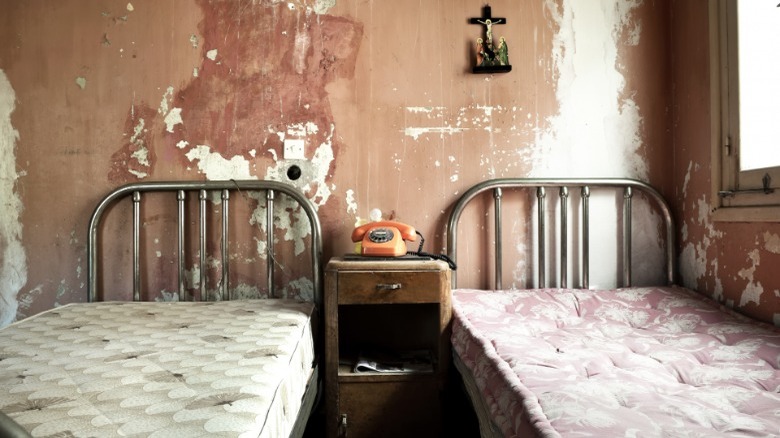Red Flags To Look For When Booking A Hotel
It's always a leap of faith to book a hotel somewhere new. Yes, you invariably do your research, compare your options, and click "book" with relative confidence — but ultimately, you're putting your trust in a hotel you've never seen. With that click comes an unspoken prayer: "Travel gods, let the photos be accurate, let the reviews be authentic, and most of all, let my money stay safe."
Often, your pleas are answered without incident. The hotel serves as a great home base for your travels and, in some cases, even a destination in its own right. But travel enough, and you will inevitably run into hotels that misled you or were downright dishonest in their listings. The worst of these hotels don't actually exist at all. Next time you book your hotel, don't leave anything to chance. If you spot any of the following red flags — like vague listings, poor fire safety, and strange requests — move on to other lodging options.
Everything looks lovely ... and vague
Hotel websites sure can be pretty, but true authenticity is in the details. Savvy travelers look into everything a hotel says — and everything it doesn't. Say you're booking a family trip to San Diego. A hotel website might feature breathtaking photos of the coastline or promise you'll be right near San Diego Zoo. It might boast about "luxury suites" and "premium amenities." But what about the hotel's address? Its specific room rates? Its pet and parking fees? They're nowhere to be found. These shiny but hollow listings are likely scams, warns the Federal Trade Commission (FTC), a government agency that protects American consumers.
If a hotel's website lacks crucial details, contact the company and ask for more information. If it won't provide it — and you can't confirm it with resources like Google Maps and independent review sites — take your business elsewhere. As we've written about before, identifying fake travel websites is becoming more and more of an essential skill. Columbia University lists several ways to identify legitimate websites, including searching for a "padlock" symbol near your browser's URL field or making sure "https://" is listed at the beginning of the URL itself.
The photos don't match reality
Most travelers accept that the photos (and even videos) on a hotel's website will be a bit more vivid than reality. That's advertising, and it could draw your eye to what really is an exquisite place to stay. But there's advertising, and then there's false advertising — so before you commit to a hotel, do a little reality check. Pull the hotel up on Google Maps, click its listing, and navigate to the photos section. You'll likely see user-submitted photos alongside promotional glamor shots. If it looks like two different hotels, well, we don't have to tell you which photos are accurate.
If the photos pass the reality check, stay on Google Maps and find the hotel on Street View. (Walkthroughs and reviews posted on YouTube by past guests are illuminating, as well.) Do you notice anything negative about the exterior or the area that the website didn't mention? Does a certain outdoor feature, like a dog park or a pool, look measly compared to the promo photos? Weigh all of that into your decision. The takeaway: If the public paints a craggier picture, that's often the reality.
You can't get ahold of them
It's always a good idea to call the hotel you plan to book, even if you complete the process online. They can answer any questions you have after your research and confirm amenities listed online are still available. If the hotel doesn't answer your first call, cut them some slack. Hotel receptionists are busy folks. Try again during a lull in the day — usually a short time after check-out — and you'll likely get them on the line.
But if they don't answer repeated calls, this — at best — indicates an overworked staff. At worst, it could mean the hotel is poorly run, unresponsive to customer requests, or even out of business. The same applies to emails. If the hotel provides an email but never responds, this could indicate a larger issue with its customer service. Give them a call, rinse, and repeat.
Correspondence is hostile or inadequate
Start with what you can control: When you get a hotel on the line, treat the person on the other end with kindness. It's often reciprocated. But if the hotel worker treats you inhospitably, and that won't fly with you, don't hesitate to look elsewhere. If they treat you this way when you're a prospective customer, that doesn't bode well for when they have your money. Similarly, if they can't provide adequate information about the hotel, that takes away your ability to make an informed choice as a traveler. Find a hotel that can give you a full picture.
Now, this requires some important context when traveling internationally, or even to a different part of your home country: Your culture likely influences your service expectations. In Piyush Sharma's expansive summary of cross-cultural customer service interactions, he notes that Americans tend to have high customer service expectations and low tolerance for what they deem poor service. "Customers from diverse cultures also use different factors to evaluate their service experiences," Sharma writes.
In some cultures, for instance, an informal or friendly attitude from a service provider is appreciated; in others, it's seen as disrespectful. So before you call, do a little research, and try to enter the exchange with cultural norms in mind. Accepted tones, discussion topics, and even greetings can vary considerably from place to place.
The prices are suspiciously low
If you find an unbelievable deal in a place you've never been on the internet, hold your click. Our old pals at the FTC say this can be another way scammers get their grubby hands in travelers' pockets. It's always best to check the hotel's official website and compare the prices. You might actually get the best deal straight from the source. Otherwise, treat incredibly low prices (or any prices, really) with caution.
Listings on top online travel agencies (OTAs) — like Expedia, Booking.com, and Priceline — can generally be trusted as authentic. These sites have direct deals with the hotels they list. It's the aggregators, which simply compile deals from across the web, that can turn up shady results. If your search brings up deals from OTAs, hotels, and other sources, you're using an aggregator — and that's where shady sites can sneak in.
However you come across it, do some googling if you find a rock-bottom price. Does the site offering it have a large online presence? Good reviews from trusted sources? A clean reputation with the Better Business Bureau? If not, walk. And, in the end, it's best to call the hotel itself and ask it to confirm the listing is authentic. In 2017, the FTC reported on "allegedly deceptive practices" from third-party sites, like mimicking hotels' official websites or having dodgy payment and cancelation terms. While the commission is onto them, you should stay alert nonetheless.
It's not fire safe
Yes, your hotel is a jumping-off point for your adventures. It's all the lovely amenities that catch your eye and level up your trip. But above all, it's a shelter, and it should keep you safe. From 2014 to 2016, the U.S. Fire Administration reported an average of 3,900 hotel and motel fires, resulting in 100 injuries and 15 deaths, each year.
To protect yourself, run a quick search on the Hotel-Motel National Master List. This is a database of all U.S. hotels that comply with simple fire safety measures. Hotels on this list have reliable smoke detectors and a sprinkler system (if the hotel is four stories or higher) in each room. And most importantly, they're approved for federal government employees to visit on official travel. Not a bad measuring stick. If the federal government holds hotels to this standard, why shouldn't you?
They don't offer the accommodations you need
Beige flags to some may be bright red to you. Maybe you have mobility restrictions and need your hotel to be ADA-compliant. Maybe you need restaurants that can accommodate your dietary restrictions. Maybe you need a shuttle service or proximity to rideshare services — or heck, maybe you're traveling for work and just need Wi-Fi or onsite laundry.
You're not being picky by moving on from hotels that don't meet all your needs. You're being you, and there's probably a hotel for that. To make it easier, search for hotels on a booking site with extensive search filters. On Expedia, for instance, you can filter for hotels that allow service animals, have electric car chargers, or are welcoming to LGBTQ guests. Over on Booking.com, you can weed out hotels that don't have grab rails in the bathroom or even hotels that don't have golf courses within 2 miles.
Multiple reviews point out the same issues
Avoiding hotels plastered with bad reviews is a given. But steer especially clear if reviewers across time and space harp on the same problems repeatedly. Every hotel has a bad day, but not every hotel has the same bad day over and over again. If you're in a pinch, however, you might be able to pluck a few bruised apples out of the bin. Just look a little closer at the reviews. If reviews were overwhelmingly bitter for years, that will weigh down the hotel's average rating; but, if they've turned sweet in the past year or two, and other aspects (like location, amenities, or price) appeal to you, you can evaluate it with fresh eyes.
It still might not pass your check. But hotels, like any business, can change owners and management teams, and that can make a difference. Similarly, don't be afraid to reconsider if you see persistent issues — say, everyone ragged on the low-quality furniture from 2017 to 2020 — clear up, or even better, do a 360 in reviews. Run it through the reality checks mentioned above, and it might pass.
You may also consider looking the company up on Indeed, Glassdoor, and other employee review sites. If the hotel tends to receive negative employee reviews, you might choose to stay elsewhere, thereby helping to create a better hospitality industry by rewarding good employers. Also, a place that fosters a healthy work environment may reflect the establishment's overall atmosphere.
It won't take traditional payments
You've done your due diligence and you're ready to book your hotel. San Diego, here we come! You grab your card and prepare to enter that sequence of numbers you're quickly learning by heart — but you don't have a chance. The hotel is asking for cryptocurrency. A wire transfer. Gift cards?
Turn back. That flag is crimson red. These unusual payment methods always indicate a scam, the FTC warns. Fraudulent entities won't accept traditional payment methods, but they love things like gift cards or wire transfers. Once you send them, it's incredibly difficult for you to get your money back.
Any reputable hotel will accept your credit card, debit card, or other traditional payment method. Don't get wrapped up in anything else. Before you move on, help a future traveler out. Report the suspicious practices to the FTC at ReportFraud.FTC.gov to help get the crooks off the web.
It has exorbitant fees
Just as a watched pot never boils, a watched price never grows. It's when you leave the kitchen — or click "head to checkout" — that stuff just seems to happen. In the case of hotels, it's the resort fees, service fees, and even legitimate local taxes that bubble up. Those things can put what you thought would be an affordable vacation right out of your budget.
The FTC recommends calling the hotel to ask about upcharges like these. You can also do a quick dry run without entering your payment information to see what fees get attached to the dummy room. Either way, it's best to learn of these fees upfront so you don't waste time, or worse, your money. While the current federal administration has indicated going after "junk fees" and misleading pricing practices in the hotel industry, a little due diligence is still necessary. Also, if you speak with the hotel directly, you may be able to get out of paying for hotel resort fees, as well as other hidden fees and surcharges.










